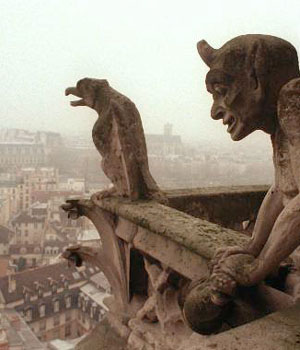M y last entry reminded me of this blog I wrote in 2006.
I have loved this song of Jacques Brel’s since I first heard it last year and have tried on various occasions to translate it.
Here is the original with my various attempts at translation from 2006
Le Plat Pays
Avec la mer du Nord pour dernier terrain vague
Et des vagues de dunes pour arrêter les vagues
Et de vagues rochers que les marées dépassent
Et qui ont à jamais le cœur à marée basse
Avec infiniment de brumes à venir
Avec le vent de l’est écoutez-le tenir
Le plat pays qui est le mien
Avec des cathédrales pour uniques montagnes
Et de noirs clochers comme mâts de cocagne
Où des diables en pierre décrochent les nuages
Avec le fil des jours pour unique voyage
Et des chemins de pluie pour unique bonsoir
Avec le vent d’ouest écoutez-le vouloir
Le plat pays qui est le mien
Avec un ciel si bas qu’un canal s’est perdu
Avec un ciel si bas qu’il fait l’humilité
Avec un ciel si gris qu’un canal s’est pendu
Avec un ciel si gris qu’il faut lui pardonner
Avec le vent du nord qui vient s’écarteler
Avec le vent du nord écoutez-le craquer
Le plat pays qui est le mien
Avec de l’Italie qui descendrait l’Escaut
Avec Frida la Blonde quand elle devient Margot
Quand les fils de novembre nous reviennent en mai
Quand la plaine est fumante et tremble sous juillet
Quand le vent est au rire quand le vent est au blé
Quand le vent est au sud écoutez-le chanter
Le plat pays qui est le mien.
I see it as a love poem which Brel wrote to his native land, and, as a poem it is beautifully written.
It has a wonderful sonorous music with its rolling “Rs” and sibilant “Ss” to suggest the tides and winds which batter Belgium.
When recited aloud or chanted, which is the treatment Brel gives the poem himself in his recordings, it sounds both mellifluous and dark.
It also has a meticulous structure with the four stanzas representing the four winds and the four seasons.
When our book club, in 2006, decided that the next meeting should be that we each pick and recite our favourite poem there was no choice for me but this poem.
The only problem was a suitable translation.
The only English versions which I could find were not at all to my liking so I set about working out my own.
My first attempt was a literal and faithful translation:
The Flat Land
With the north sea as the last abandoned post
The lines of sand dunes stand to break the waves
But still the tide comes in and bares the rocks
Which show their naked blackness to the sea
And then the endless mist drops down
With the east wind , which grasps
The flat land which is my own.
With the tall churches as the only mountains
With black steeples like the masts of ghostly ships
With their stone devils piercing the clouds
And only the turning days to mark their passing,
And only the falling rain to bid them “god speed”
And then the west wind, listen to him steal
The flat land which is my own
With a sky so low that a canal lies hidden
With a sky so low it instils humility
With a sky so grey the canal ceases flowing
With a sky so grey that this must be forgiven
With the North wind which rips us asunder
With the north wind, listen to its whiplash
On the flat land which is my own
Then when Italian warmth falls on the rivers
Winter’s Frieda becomes summer’s Margot
And the beats of November become the rhythms of May
When the land steams and trembles in July
When the wind laughs, when the wind bears fruit
When the wind is in the South listen to it sing
To the flat land which is my own
This was all fine in its way but where was the music which was so integral to Brel’s original?
I decided that I would have to try and sacrifice the literal translation to get back to Brel’s musical rhyme.
This leads to my second version, a bit free, and not a patch on the original but I hope it conveys a little of my admiration for the poem.:
The Flat Land.
With the north sea as the last abandoned post
The lines of sand dunes stand to save the coast
But still the tide comes in and bares the stones
Which show the cold North sea their blackened bones
Then, as the endless mist the land enfolds
Then comes the east wind , the wind that holds
The flat land
Which is my own.
Where tall churches are the only peaks
With black steeples like the ghostly beaks
Of stone devils piercing through the fog
With only the turning days to mark their log
And only the falling rain to bid “god speed”
And then the west wind, listen to his need
Of the flat land
Which is my own
With a sky so low the canals lie hidden
With a sky so low sorrow comes unbidden
With a sky so grey the canals cease flowing
With a sky so grey even this is forgiven
Then comes the North wind which rips all asunder
In comes the north wind , roaring like thunder
On the flat land
Which is my own
And then warm Italy blows up river
And the seeds of November make May quiver
And winter’s Frieda make Junes’s Daisy
Then July is steaming , and trembling and hazy
Then the wind laughs, then the wind is ripe
Then the wind is in the South listen to its pipe
In the flat land
Which is my own


Comments
The comments are closed.